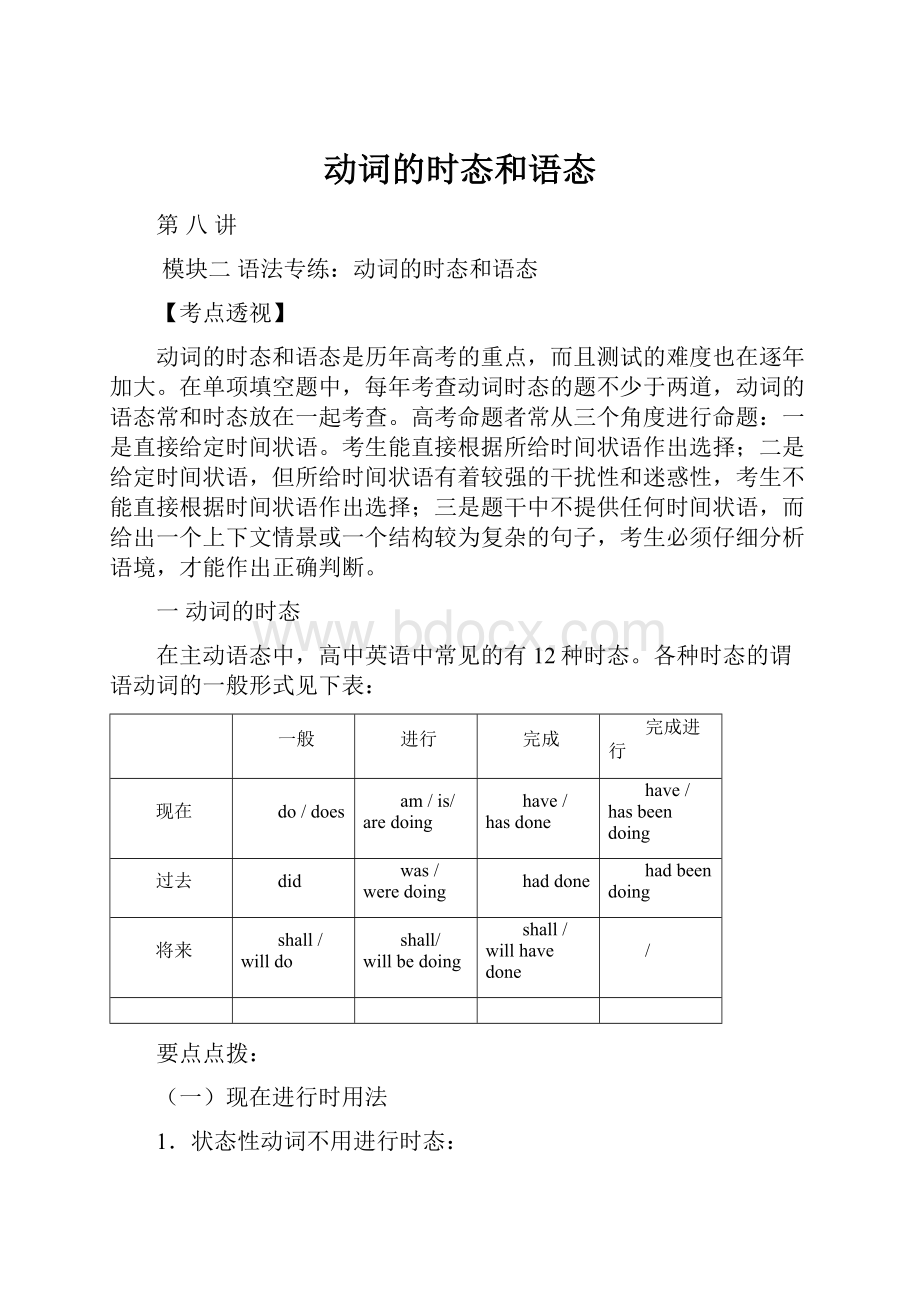动词的时态和语态.docx
《动词的时态和语态.docx》由会员分享,可在线阅读,更多相关《动词的时态和语态.docx(20页珍藏版)》请在冰豆网上搜索。

动词的时态和语态
第八讲
模块二语法专练:
动词的时态和语态
【考点透视】
动词的时态和语态是历年高考的重点,而且测试的难度也在逐年加大。
在单项填空题中,每年考查动词时态的题不少于两道,动词的语态常和时态放在一起考查。
高考命题者常从三个角度进行命题:
一是直接给定时间状语。
考生能直接根据所给时间状语作出选择;二是给定时间状语,但所给时间状语有着较强的干扰性和迷惑性,考生不能直接根据时间状语作出选择;三是题干中不提供任何时间状语,而给出一个上下文情景或一个结构较为复杂的句子,考生必须仔细分析语境,才能作出正确判断。
一动词的时态
在主动语态中,高中英语中常见的有12种时态。
各种时态的谓语动词的一般形式见下表:
一般
进行
完成
完成进行
现在
do/does
am/is/aredoing
have/hasdone
have/hasbeendoing
过去
did
was/weredoing
haddone
hadbeendoing
将来
shall/willdo
shall/willbedoing
shall/willhavedone
/
要点点拨:
(一)现在进行时用法
1.状态性动词不用进行时态:
(1)be和have或者含有be和have意义的动词。
(2)feel,sound,smell,taste等连系动词。
(3)hear,see,find等表示结果的动词。
(4)表示心理或情感状态的动词。
2.进行时态和副词always,forever等连用时,往往带有一定的感情色彩。
(二)一般过去时与过去进行时的区别:
1.过去进行时表示动作的未完成性、持续性,着眼于动作的过程;一般过去时表示动作的完成,即动作发生过,且已结束,着眼于结果。
如:
ShewaswritingareportlastnightandIdon’tknowifshehasfinishedit.(表示昨晚一直在写)
Shewroteareportlastnight.(表示昨晚写了,并且写好了)
2.过去进行时与always,forever等词连用表示一定的感情色彩。
Hewasalwaysthrowingthingsabout.(表示不满或讨厌)
(三)将来时的几种表达:
A
B
C
D
begoingto
表示“计划、打算、安排将要做的事”时,主语只能是人
说话人说话之前已考虑过的
主语是物时,表示说话人根据某种迹象主观推测可能发生的事
不能用于含有条件句的主句中
will
表示将要发生某事或主语的“意愿”
说话人说话时刻才考虑到的
表示客观规律必然发生的
可用于含有条件句的主句或从句中表示“意愿”
beto
表示安排、计划要做的事
与第二人称连用,表示转述第三者的话
表示命令,相当于should/must
表示“能”、“该”、“想要”、“注定、不可避免”
beaboutto
表示动作马上发生;句中不能再加atonce,immediately和表示具体时间的词语;常有“beaboutto…..when”结构;
还可用一般现在时、现在进行时表示将来发生的动作。
(四)将来进行时与将来完成时:
将来进行时表示将来某一时刻发生的动作,结构为:
will/shallbe+doing
将来完成时表示到将来某时刻某动作已发生,其结构为:
will/shallhavedone,时间状语是by+表将来时间的词。
例如:
I’llbeclimbingthemountainthistimethedayaftertomorrow.
Bythetimehegraduatesfromthecollege,hewillhavelearnedthreeforeignlanguages.
(五)现在完成时及过去完成时的用法注意点:
1.瞬间性动词与延续性动词的正确使用:
与howlong,for,since等表示一段时间的状语连用时须用延续性动词,如:
buy→have,keep→borrow,die→bedead,marry→bemarried,begin→beon,begintoknow→know,leave→beaway,catchacold→haveacold等。
2.注意have/hadbeento与have/hadgoneto的区别。
3.现在完成时用在时间、条件等状语从句中,表示从句中的动作在主句动作前完成,例如:
Ifithasstoppedsnowinginthemorning,we’llgotothepark.
4.by+过去时间状语用过去完成时。
5.有些动词的过去完成时表示过去未曾实现的意图、打算或希望,这类动词为:
think,plan,mean,intend,hope,expect,suppose等。
例如:
Ihadintendedtovisityouyesterday,buttherainpreventedme.
(六)现在/过去完成进行时的用法:
强调动作延续到说话时且还在进行,其结构:
have(has)/hadbeendoing
比较:
Theyhaverepairedtheroad.(表示路已修好)
Theyhavebeenrepairingtheroad.(表示路还在修)
有时两者可替换:
Shehastaughtinthismiddleschoolfortenyears.
Shehasbeenteachinginthisschoolfortenyears.
注意:
完成进行时不可与瞬间性动词连用,如:
finish,go,marry等;
(七)某些固定句型中时态是固定的:
This/That/Itisthefirsttime+从句(用现在完成时)
It’s/hasbeen+一段时间+since从句(用过去时)
Hardly/Nosoonerhadsb.donewhen/than+从句(用过去时)
Itwillbe+一段时间+before从句(用一般现在时)/Itwas+一段时间+before从句(用过去时)
It’stime+从句(用过去时或shoulddo)
wouldrather+从句(用一般过去时/过去完成时)
二动词的语态
在被动语态中,各种时态的谓语动词的一般形式见下表:
一般
进行
完成
现在
am/is/aredone
am/is/arebeingdone
have/hasbeendone
过去
was/weredone
was/werebeingdone
hadbeendone
将来
shall/willbedone
/
shall/willhavebeendone
注意:
带有情态动词的被动语态的构成:
情态动词+be+过去分词
应注意的若干情况:
1.动词sell,write,read,open,lock,shut,wear,wash,keep,cook,cut,burn,run等与well,smoothly,easily等连用时,说明主语内在的“性能”“特点”,用主动代替被动。
2.smell,taste,feel,sound,look,prove等表示状态特征的连系动词,用主动语态表示被动意义。
3.不及物动词及一些固定短语不能用被动语态:
comeup,runout(用完),giveout(耗尽),goout(熄灭),comeout(出版),cometolight,belongto,breakout,loseheart,dieout,own,have,possess,happen,occur等。
4.当want,require,need作“需要”解,后接doing/tobedone作宾语,此时动词do与主语为动宾关系。
5.beworth后接doing作宾语,用主动形式表示被动意义。
6.不定式tolet(出租),toblame(该受责备)表示被动意义。
7.在“主语+be+形容词(forsb.)+todo”结构中,todo用主动形式。
【题例精析】
【例1】Itseemswater______fromthistapforsometime.We’llhavetotakeitaparttoputitright.(2007南京模拟卷)
A.hadleakedB.isleaking
C.leakedD.hasbeenleaking
【易错点悟】解答该题的关键是要准确把握句中的时间状语forsometime所强调的时间段以及所使用的动词时态。
【要点精析】根据句中时间状语forsometime以及后一分句的动词时态可知,选项动词动作强调到现在为止并仍在继续,故应排除选项A、C。
由于选项B现在进行时不可与一段时间状语连用,所以排除选项B,选D现在完成进行时。
【答案】D
【例2】—Don’tyoufeelsurprisedtoseeBruceatthemeeting?
—Yes.Ireallydidn’tthinkshe________here.(2006四川卷)
A.hasbeenB.hadbeen
C.wouldbeD.wouldhavebeen
【易错点悟】解答该题的关键是根据上下文语境准确理解选项动作所表达的时间发生点。
【要点精析】根据上下文语境可知,选项动作已在过去发生或完成。
但根据Ireallydidn’tthink可以判断出从句中的动作是从过去某时间看将来要发生的事,故应选过去将来时。
【答案】C
【专项检测】
1.―IsPaulplayingbothsoccerandtennisfortheschool?
―He_______.Butnowhehasgivenupplayingtennis.
A.isB.has
C.wasD.had
2.―Look!
Itlooksasifit_______goingtorain.Wemusthurry.
―OK.
A.wasB.is
C.wereD.willbe
3.―Isn’tithardtodrivedowntowntowork?
—Yes,that’swhyI________toworkbytrain.
A.havebeengoingB.havegone
C.wasgoingD.willhavegone
4.—Look!
Someonehasspiltcoffeeonthecarpet.
—Well,it________me.
A.isn’tB.wasn’t
C.hasn’tbeenD.hadn’tbeen
5.—I’veboughtaboxofchocolatesforourdaughter.
—Oh,howgoodadad!
Butshedoesn’tlikesweetthings.________that?
A.Don’tyouknowB.Haven’tyouknown
C.Didn’tyouknowD.Hadn’tyouknown
6.—Hello,Jim.I________toseeyoutoday.Soniasaidyou________ill.
—Oh,I’mOK.
A.don’texpect;wereB.haven’texpected;are
C.amnotexpecting;areD.didn’texpect;were
7.—Look!
Howlong________likethis?
—Threeweeks!
It’susualherethatrain_______withoutstoppingthesedaysoftheyear.
A.hasitrained;poursB.hasitbeenraining;pours
C.isitraining;ispouringD.doesitrain;pours
8.Ourteamwasaheadduringthefirsthalf,butwe________inthelasttenminutes.
A.hadlostB.wouldlose
C.werelosingD.lost
9.Youneedn’thurryher;she_______itbythetimeyouareready.
A.willhavefinishedB.willfinish
C.willbefinishingD.hasfinished
10.—Whoistheoldmantalkingwithyourteacher?
—Idon’tknow.I_________himbefore.
A.wasneverseeingB.hadneverseen
C.neversawD.wouldn’tsee
11.—Tomcamebackhomethedaybeforeyesterday.
—Really?
Where__________atall?
A.hadhebeenB.hashebeen
C.hadhegoneD.hashegone
12.—CanIhelpyou,Madam?
—No,thanks.I_______.
A.havejustlookedaroundB.justlookaround
C.justlookedaroundD.amjustlookingaround
13.—Ihaven’tseenyouforages.Wherehaveyoubeen?
—I_______onleaveinEurope.
A.havebeenB.am
C.wasD.hadbeen
14.—HaveyouheardfromJanetrecently?
—No,butI______heroverChristmas.
A.sawB.willbeseeing
C.haveseenD.havebeenseeing
15.—Whatwereyouuptowhenshedroppedin?
—I_________forawhileand__________somereading.
A.wasplaying;wasgoingtodoB.played;did
C.hadplayed;wasgoingtodoD.hadplayed;did
16.Hewashopingtogoabroad;buthisparents__________thattheywon’tsupporthimunlesshecanborrowmoneyfromthebank.
A.weredecidingB.havedecided
C.decidedD.willdecide
17.Withmoreforestsbeingdestroyed,hugequantitiesofgoodearth_______eachyear.
A.iswashingawayB.isbeingwashedaway
C.arewashingawayD.arebeingwashedaway
18.Mymindwasn’tonwhathewassayingsoI’mafraidI__________halfofit.
A.wasmissingB.hadmissed
C.willmissD.missed
19.Thenewscameasnosurprisetome.I______forsometimethatthefactorywasgoingtoshutdown.
A.hadknownB.knew
C.haveknownD.know
20.Oneofthemtoldme,“ThisisthefirsttimeI________tothecapitaltoattendtheflag-raisingceremony.”
A.cameB.come
C.havecomeD.hadcome
21.―Doyouhaveanythingtodothisafternoon?
―What’sup?
―Let’sgoshopping.It’ssaidthatJinyingShop_____,andallthesweatersaresoldathalfprice.
―Whynot?
A.hascloseddownB.wasclosingdown
C.closesdownD.isclosingdown
22.―Whatabout10o’clocktomorrowmorning?
―I’mafraidIcan’tmakeit.I_________then.
A.amgoingtotakeanexamB.amtakinganexam
C.willbetakinganexamD.antotakeanexam
23.―What’sthematter?
Youlookworriedandrestless.
―Oh,nothingreallyserious.Asamatteroffact,I______ofmygraduationthesis.Ihavetohanditinsoon.
A.amjustthinkingB.justthought
C.havejustthoughtD.wasjustthinking
24.―Twentydollars,please!
―Howterrible!
―I________tobringmywalletwithme.
A.wasforgettingB.forgot
C.hadforgottenD.amforgetting
25.Mymoney_____,ImustgotothebanktodrawsomeofthesavingsoutbeforeIhavenoneinhand.
A.hasrunoutB.hasbeenrunout
C.isrunningoutD.isbeingrunout
26.―WhatwereyoudoingwhenIcalledyouyesterdayafternoon?
―I________myhomeworkandIwasstartingtotakeabath.
A.hadjustfinishedB.wasfinished
C.havealreadyfinishedD.wasgoingtofinish
27.―________forBeijing?
―Yes.AndI’llcomebackinthreemonths.
A.HaveyouleftB.Areyouleaving
C.DoyouleaveD.Didyouleave
28.―Why?
Whereisthekeytothesoundlab?
―Dearme!
You_______itinthetaxi!
A.haveneverleftB.neverleft
C.haven’tleftD.didn’tleave
29.―Wasthedoctortherewhenyouarrived?
―Yes,buthe______outamomentlater.
A.hadgoneB.hasgone
C.wentD.isgoing
30.Inwarmweatherfruitandmeat________long.
A.don’tkeepB.can’tbekept
C.arenotkeptD.aren’tkeeping
31.―Thetelephoneisringing.
―I_________answerit.
A.willB.amgoingto
C.amtoD.amaboutto
32.―Whatdoyouthinkofmycomposition?
―It_______well_____afewspellingmistakes.
A.reads;exceptforB.read;besides
C.isr